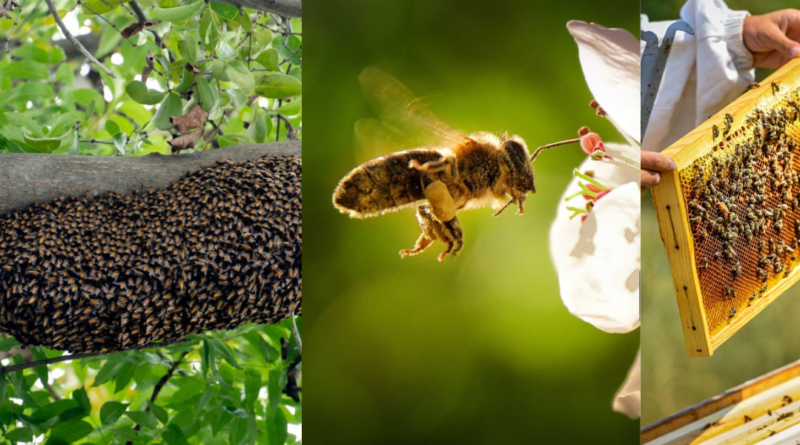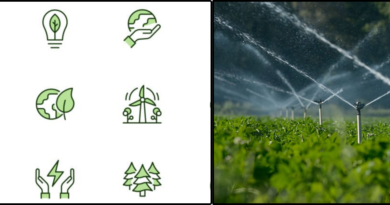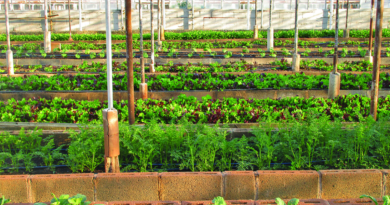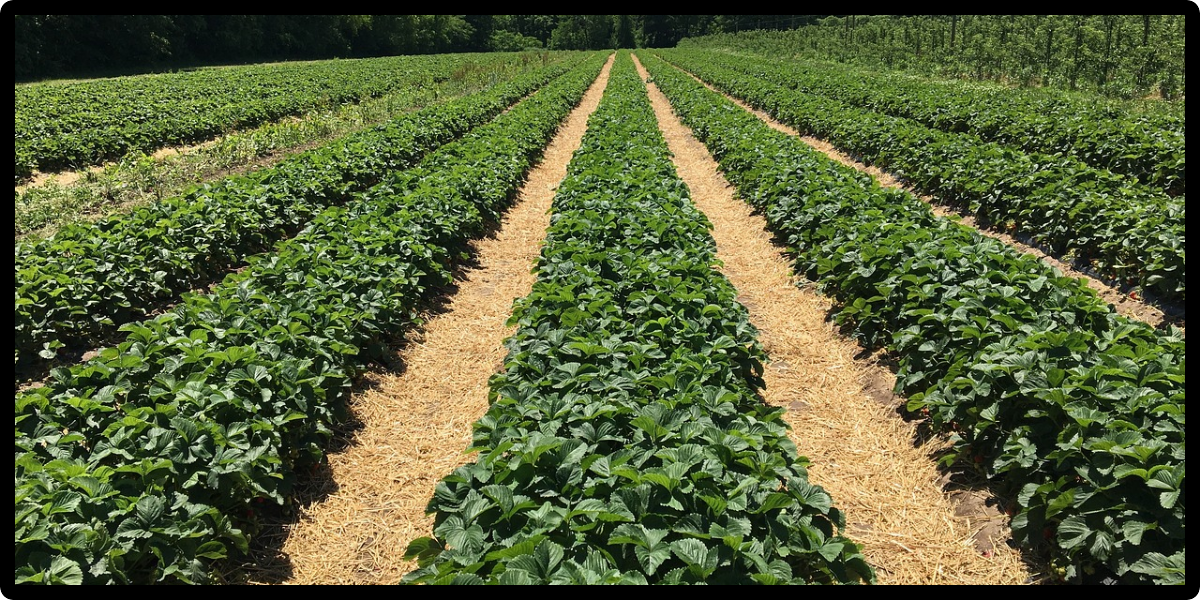Role of Bees in Organic Farming and Pollination
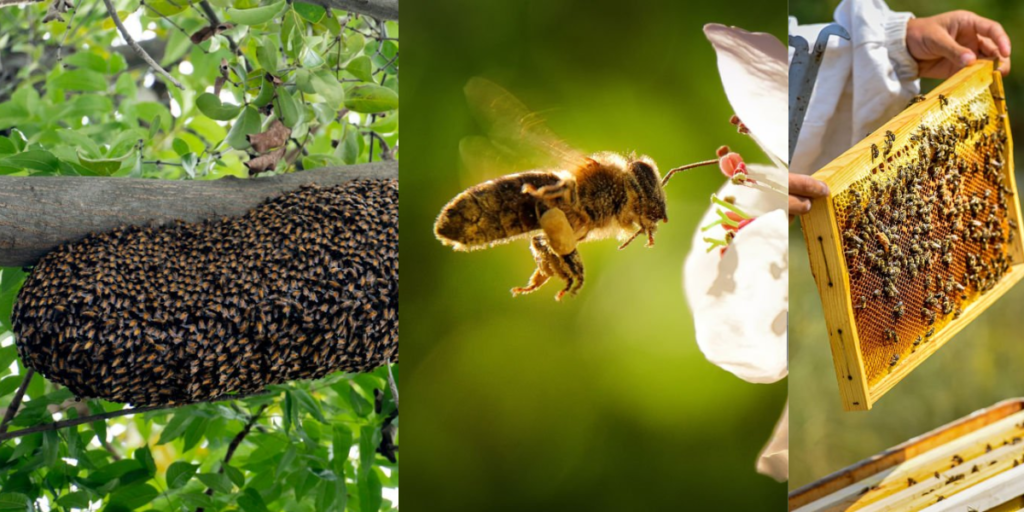
Introduction:
The role of the bee is an important ally in organic farming, where sustainability, biodiversity, and ecological harmony come together, in addition to its role as a pollinator. Greetings from the humming world of bees and organic farming, a mutually beneficial alliance that promises a healthier, greener future for our planet in addition to bountiful crops. Examining the complex relationship between sustainable agriculture and these hardworking pollinators reveals a story of interconnection that extends well beyond the fields and reflects the spirit of peaceful coexistence between people and the natural world.
Significance of Bees in Organic Farming
We explore the role of bees in organic agriculture and how their ability to pollinate plants and their symbiotic relationship with the environment create a symphony of growth, biodiversity, and sustainability.
Abundance of Pollination:
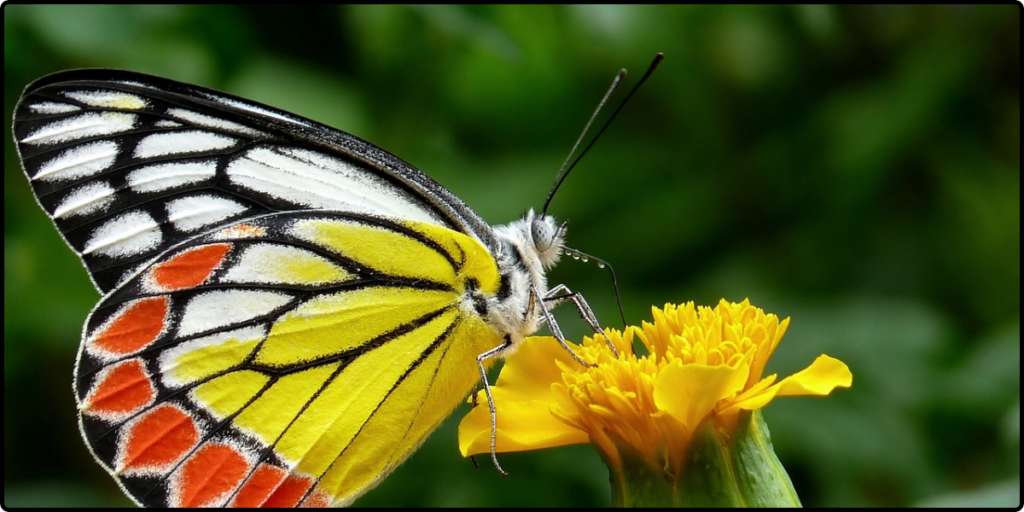
- As excellent pollinators, bees help blooming plants reproduce by moving pollen from male to female flower parts.
- Not only is this a biological wonder, but it also serves as the foundation for organic farming, guaranteeing the development of fruits, vegetables, and nuts.
Increased Biodiversity
- There are many different plant species supported by ecosystems that are made richer by the diversity of bees.
- Because organic farms have a strong focus on biodiversity, they provide a variety of bee species with the perfect home, sustaining a healthy cycle of growth.
Organic Pest Management:
- Through their support of a healthy ecology, bees indirectly aid in the management of pests. Beneficial insects drawn to a healthy and varied plant life prevent dangerous pests.
- This completely eliminates the necessity for artificial pesticides, which is in line with organic agricultural tenets.
Support for Seed Production:
- In order to maintain genetic variety and resilience in plant populations, bees are essential to the generation of seeds.
- This naturally occurring seed development helps organic farmers by lowering their need for commercial seed suppliers and promoting an agricultural system that can support itself.
The protectors of genetic diversity:
- Bees contribute significantly to the genetic diversity of plants in ways other than pollination. They help plant populations remain resilient and vigorous by aiding in the movement of pollen.
- Aware of the value of maintaining natural genetic variety, organic farmers view bees as protectors of a robust and dynamic agricultural environment in addition to pollinators.
Partners in Sustainability:
- A fundamental aspect of organic farming How Sustainable Practices Can Extend Your Life is its dedication to sustainability, and bees are unintentional collaborators in this admirable endeavor. Their pollination services result in higher crop yields, which sustains the financial sustainability of sustainable farming methods.
- Farmers that adopt organic agricultural practices unintentionally take on the role of guardians of bee-friendly environments, fostering a mutually beneficial connection in which one’s sustainability enhances the well-being of the other.
In summary:
A vibrant ecosystem’s heartbeat, the hum of bees is more than just a background tune as we stroll across organic farmers’ sunflower-strewn fields and orchards. Beyond the realm of agriculture, bees are important in organic farming because they represent a fine balance between nature’s builders and the guardians of sustainable development.
Bees and organic farming practices:
A quiet yet dynamic relationship develops between the diligent farmer and the hardworking bee in the sun-drenched organic agricultural settings. This dance illustrates a story of mutualism that goes beyond simple pollination when seen against the backdrop of sustainable practices and biodiversity.
Polyculture and crop rotation:
- Crop rotation and polyculturehttps://en.wikipedia.org/wiki/Polyculture is prioritized in organic farming to avoid monoculture, which can be harmful to bee populations.
- Throughout the year, a variety of blooming plants offer a bounty of possibilities for bees to bloom, guaranteeing a consistent flow of food.
Zones Exempt from Chemicals:
- Bees benefit greatly from organic gardening as there are no artificial pesticides or herbicides used.
- Organic farming, as opposed to conventional farming, protects pollinators by avoiding collateral damage from dangerous pesticides.
Improvement of Habitat:
- In their fields, organic farmers actively work to create bee-friendly environments by introducing native plants and wildflowers.
- These places act as bee sanctuaries, giving them a steady supply of pollen and nectar.
Preservation of Water Resources:
- Bees flourish in habitats that carefully manage and conserve water resources. The requirements of these important pollinators are well aligned with organic farming, which is frequently linked to water-efficient techniques.
- Water resources are wisely used to maintain lush, vibrant ecosystems that support bees, which benefits the agricultural ecology as a whole.
Integrated Control of Pests:
- Bees and organic farming go hand in hand, and integrated pest management techniques are no exception. Organic farmers use a comprehensive strategy for pest management rather than depending just on chemical pesticides.
- Attracting a variety of plants, beneficial insects serve as natural predators, preserving a delicate balance that keeps dangerous pests in check without endangering the ecosystem or the bees.
Technology for Monitoring Bees:
- Organic farmers are embracing technology The Role Of Artificial Intelligence in sustainable agriculture and using creative techniques to track bee numbers more and more. Sensing-enabled smart beehives offer up-to-date information on temperature, activity, and hive health.
- By incorporating technology into beekeeping techniques, farmers are able to react quickly to problems that impact bee colonies, safeguarding both the health of the colony and the success of pollination in organic fields.
Global Promotion of Bee-Friendly Laws:
- Pollinator protection measures are something that organic farmers frequently lead the way in promoting. Their combined voice may be heard in regional, national, and even international forums where the value of bees and environmentally friendly farming methods are hot topics.
- Organic producers have an impact on policy decisions, which helps to establish a regulatory framework that protects the interests of agriculture as well as the delicate environmental balance that bees maintain.
Research Collaboration Initiatives:
- The dynamic area of bee-organic farming synergy benefits from further study and cooperation. Collaborative efforts are undertaken by scientists, conservationists, and farmers to get a deeper understanding of the complex interactions involved.
- The results of research help to improve organic farming methods so that they stay at the forefront of resilience and sustainability Mindful Consumption: Choosing Sustainable Products for a Healthier Future, so that bees may continue to flourish in agricultural environments
Integrating Beekeeping:
- Some organic farmers view their relationship with bees as extending beyond the crops into the beekeeping world. An effective strategy for maintaining a healthy and stable bee population is to incorporate beehives into agricultural landscapes.
- The production of honey and the wellbeing of pollinators are two roles that beekeepers oversee. Their meticulous management of bee colonies delivers the delicious rewards of honey and nourishes the surrounding ecology, demonstrating the interrelated benefits of organic farming.
Conclusion:
It is evident that there is much more to this cooperation than meets the eye when we consider the deep relationship that exists between organic agricultural methods and bees. Every aspect—wildflowers, beekeeping, technological innovation—contributes to a tapestry of sustainability in this dynamic interaction. It is not only a decision; farmers, scientists, and communities all have a shared obligation to protect bee habitats and enhance their welfare. The relationship that exists between organic farming methods and bees is still a living example of the possibilities for coexistence between human agriculture and the healthy ecosystems that surround it.
Understanding Threats to Bees in the Realm of Organic Farming
INTRODUCTION
Bees are essential to the delicate balance of organic farming. Their path is not without difficulties, though. We bring attention to the difficulties that affect these vital pollinators as we examine the dangers that bees encounter in the context of organic farming. Raising awareness will help us work toward solutions that protect the vital relationship that bees and sustainable agriculture have.
Risks Associated with Pesticides:
- Problem: The use of pesticides seriously endangers bees, even on nearby farms that are not organic. These pesticides, which are meant to safeguard crops, can damage or even wipe out bee colonies.
- Effect on Organic Farming: Although organic farms don’t use synthetic pesticides, bees may still be exposed to hazardous materials if they are near conventional farms that do.
Climate Change Interruptions:
- Challenge: The timing and availability of flowering plants are affected by climate change, which impacts bees’ ability to connect with their food sources.
- Impact on Organic Farming: Because organic farms mostly depend on natural pollination, they are affected when changes in the climate cause a mismatch between crop blossoming times and bee activity.
Mono-Cropping Methodologies:
- Problem: Even in organic farming, large-scale monocropping techniques reduce the variety of blooming plants that bees may choose from.
- Impact on Organic Farming: A reduction in plant diversity reduces bee nutrition, which may result in weaker colonies and lowered pollination efficiency.
Loss of Habitat:
- Problem: As a result of land use changes and urbanization, bee habitats are disappearing. There are fewer areas for bees to build hives and forage when there are fewer green spaces.
- Impact on Organic Farming: Bee populations’ health and biodiversity are negatively impacted by the lack of varied feeding sites, which makes it more difficult for them to pollinate organic crops.
Intensification of Agriculture:
- Challenge: Using heavy machinery and upsetting natural landscapes might result from intensifying agriculture, even in organic settings.
- Effect on Organic Farming: The sustainability of organic farming systems may be hampered by disturbances brought on by intense agricultural techniques, which can destroy bee habitats, nesting locations, and feeding routes.
Spread of Illnesses:
- The challenge is that diseases that impact bee populations, such as the Varroa destructor mite, may move quickly across colonies.
- Impact on Organic Farming: Diseases can still spread on organic farms, even with their dedication to chemical-free methods. The state of bees directly affects how well they can pollinate crops naturally.
Insufficient Diversity in Forage:
- Challenge: Bees’ dietary intake may be impacted by a lack of varied forage sources.
- Effects on Organic Farming: Bee colonies’ health and endurance are weakened by minimal feed diversity, which may affect how well the colonies are able to pollinate organic crops.
Conclusion:
Finding sustainable solutions requires first understanding the dangers that organic farming poses to bee populations. As we work through these obstacles, it’s clear that protecting bee health is a shared obligation that affects the fundamentals of organic farming rather than merely being a beekeeper’s issue. We may endeavor to mitigate these concerns and guarantee a prosperous future for organic farming and beekeepers by raising awareness, adopting intelligent methods, and demonstrating a dedication to biodiversity.
it is our collective responsibility to champion solutions that align with the ethos of greenhealings.com. By promoting awareness, advocating for pollinator-friendly policies, and actively participating in sustainable agricultural practices, we can ensure that the buzz of bees remains a vibrant melody in the fields of green healing for generations to come.

